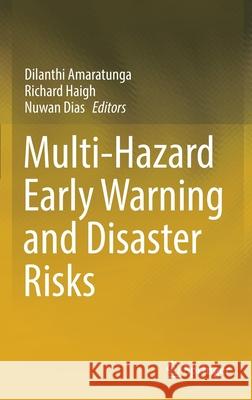Multi-Hazard Early Warning and Disaster Risks » książka



Multi-Hazard Early Warning and Disaster Risks
ISBN-13: 9783030730024 / Angielski / Twarda / 2021 / 892 str.
Multi-Hazard Early Warning and Disaster Risks
ISBN-13: 9783030730024 / Angielski / Twarda / 2021 / 892 str.
(netto: 881,78 VAT: 5%)
Najniższa cena z 30 dni: 886,75
ok. 16-18 dni roboczych.
Darmowa dostawa!
Introduction
Foreword: Dilanthi Amaratunga, Richard Haigh, University of Huddersfield, UK
1. Early warning in a changing climate
2. Risk based/informed early warning and global agendas - Sendai and SDGs
3. The first mile - Hazard monitoring; forecasting and warnings; new, innovative tools / products for strengthening EWSs
4. Early warning interface - legal and institutional framework, clearly defined actors, governance and institutional arrangements, vertical and horizontal coordination
5. Reaching the last mile - Bringing the message to communities at risk - Technical, legal and socio-cultural complexities involved in communicating coastal based hazard early warning to communities
6. Next generation of TEW dissemination
7. Using GIS technology for disaster preparedness and early warning
8. Formal and informal communication mechanisms in early warning
9. Risk transferring and forecast based financing for DRR
10. Institutionalising and sustaining early warning systems -Technical, human and operational capacity, and localisation
11. Local ownership, enhancing response capacity and community awareness
12. Measuring early warning effectiveness and ongoing evaluation
13. Simulation exercises, drills and Standard Operating Procedures (SOPs)
14. Multi-Hazard Early Warning (MHEW) Systems, including exploring the potential for synergising tsunami early warning with other hazards
15. Nature Based Solutions (NBSs) for managing disaster
Conclusions and future conferences
Professor Dilanthi Amaratunga
Professor Dilanthi Amaratunga holds the chair in Disaster Risk Management at the University of Huddersfield, UK. She is a leading international expert in disaster resilience with an extensive academic career that has a strong commitment to encouraging colleagues and students to fulfil their full potential. She provides expert advice on disaster resilience to national and local governments and international agencies including the United Nations Office for Disaster Risk Reduction. She is engaged in many significant disaster risk reduction and management research engagements around the world, in partnership with key academic and other organisational stakeholders. To date, she has produced over 400 publications, refereed papers and reports, and has made over 100 keynote speeches in around 30 countries. Among many leadership roles, she is the joint chief editor of the International Journal of Disaster Resilience in the Built Environment and the chair of the International Conference on Building Resilience (ICBR) series, which she co-created. She is a member of the European Commission and UNDRR’s European Science & Technology Advisory Group representing the UK, Steering Committee member of the Frontiers of Development programme, a Collaborative Programme of The Royal Academy of Engineering, The Academy of Medical Sciences, The British Academy and The Royal Society. She is a Fellow of the Royal Institution of Chartered Surveyors (RICS), a Fellow of The Royal Geographical Society, and a Fellow and a Chartered Manager of the Chartered Management Institute, UK. She can be contacted on: d.amaratunga@hud.ac.uk
Professor Richard Haigh
Dr Nuwan Dias
Nuwan Dias is a Research Fellow in Disaster Resilience at the Global Disaster Resilience Centre, University of Huddersfield UK. His research interests include multi-hazard early warning, integration of climate change adaptation to disaster risk reduction and resilience in urban planning and Design. He has delivered over 10 invited speeches and keynote presentations for audiences in Europe, South Asia and South East Asia. Nuwan has chaired over 20 sessions in international conferences and presented his research work in more than 30 international audiences. Further, Nuwan has published in two edited book chapters and 12 peer reviewed journal articles. He is involved in developing research impact case studies for the UK Research Excellence Framework (REF2021) under the Unit of Assessment 13, Architecture, Built Environment and Planning. Nuwan has worked in many international research projects funded by the European Commission’s Horizon 2020, Erasmus+, Lifelong Learning and the Global Challenges Research Fund in different capacities. In his different roles, he has worked with multi-stakeholders including government, non-government organisations and industry partners. Nuwan earned his PhD in Urban Design from the University of Huddersfield, UK, his Masters degree from the University of Salford, UK and the undergraduate degree from the University of Moratuwa, Sri Lanka. Further, Nuwan is a Fellow member of the Higher Education Academy of the UK. Nuwan can be contacted on: n.dias@hud.ac.uk.
This book presents a collection of papers under the theme of multi-hazard early warning and disaster risks. These were selected from the presentations made at the International Symposium on Tsunami and Multi-Hazard Risks, Early Warning and Community Awareness in supporting implementation of the Sendai Framework for Disaster Risk Reduction 2015-2030. This conference aimed to recognize achievements and to highlight work that still needs to be carried out. The conference promoted collaboration among academia, research institutions and disaster management offices, and further encouraged multidisciplinary and multi-sectoral interaction
1997-2026 DolnySlask.com Agencja Internetowa
KrainaKsiazek.PL - Księgarnia Internetowa









